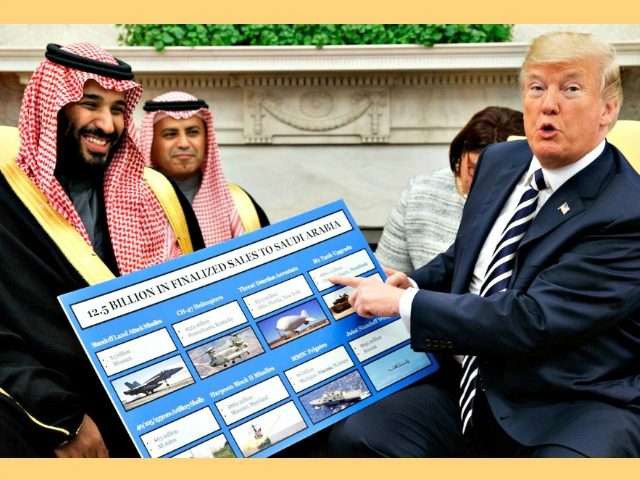Three related American foreign-policy goals—security for Israel, peace in the Middle East, and a new Middle Eastern alliance against Iran—have just scored major breakthroughs. And if you haven’t heard about these successes, maybe that’s because the Main Stream Media are so busy attacking President Trump that they’ve lost interest in foreign reporting.
On November 1, Saudi Arabia’s crown prince, Mohammed bin Salman, hosted a delegation of Christian evangelical leaders at his palace in Riyahd. The meeting was positive, smiles all around, which is quite a change, because the Saudis have not always been known for their friendliness to Christians.
Moreover, as The Jerusalem Post reported, “During the visit, the delegation also met with the Saudi Foreign Minister; the Minister of Education; the Minister of Islamic Affairs; the Secretary General of ‘Etidal,’ The Global Center for Combatting Extremist Ideology; and the Secretary-General of the Muslim World League.” In other words, this visit was of great significance, involving much of the Saudi Arabian and Islamic hierarchy.
We might also add that this meeting had been approved at the highest levels, both in Washington, D.C., and in Jerusalem. As The Washington Post noted, the spokesman for the group was Johnnie Moore, “who also serves as the White House’s unofficial liaison to a group of well-known conservative evangelicals.”
As for Israel’s involvement, we might observe that the leader of the delegation was the best-selling author Joel Rosenberg, a Christian, born in the U.S. to a Jewish background, who now lives in Israel and is close to Prime Minister Bibi Netanyahu. As The Jerusalem Post relates, Netanyahu views Saudi Arabia as “an important strategic partner in the region.”
In other words, this was high-level trip; it was, in fact, something of a summit conference, in which the views of three countries—the U.S., Israel, and Saudi Arabia—were amply represented. And yes, the crown prince and de facto leader of Saudi Arabia, Mohammed Bin Salman, is that Mohammed Bin Salman, the man who stands accused of being somehow complicit in the Istanbul murder of Jamal Khashoggi, a Saudi citizen, a supporter of the Muslim Brotherhood and of Palestinian terror—and a Washington Post columnist. So yes, Saudi Arabia is still a rough place; nobody ever said it was a Jeffersonian democracy. Yet what they say now, in addition, is that Saudi Arabia is increasingly linked with Israel and the U.S. And that’s a big deal.
As Rosenberg said in an exclusive video obtained by CBN News:
We’re under no illusions about the challenges that are in Saudi Arabia and that remain. But I think it’s respectful to go and listen to leaders who have the opportunity to make life better for Christians and Muslims and potentially for Israel as well and who are against the crazies in Iran and the Muslim Brotherhood. I’d ask people to pray. Pray for the (Jordanian) king. Prayer for the crown prince. Pray for the people of Saudi Arabia. And I think it’s the right thing to do.
So it certainly seems that everyone involved has his or her eyes open. The issue at hand is not that Saudi Arabis is going to become like the U.S., or Israel. Instead, the issue is that the Saudis might potentially cement an alliance with both the Americans and the Israelis. If so, that’s a huge development.
After all, it wasn’t that long ago that Saudi Arabia was an implacable enemy of the Jewish State. Arabia is, after all, the birthplace of the Prophet Mohammed, and the homeland of the Islamic faith. Indeed, in the past, Saudi Arabia has not only used its religious influence to foster anti-Israel hatred, but, in addition, it has used its oil wealth to finance Arab armies.
Yet all that hostility could be changing. Why? Two reasons:
First, the Palestinian issue has dissipated. It’s been seven decades since the Palestinians were made refugees during the Israeli War of Independence, and so understandably, memories of that conflict are fading as Palestinians have been absorbed into other countries. Moreover, once the Trump administration made clear that it was not interested in pursuing the familiar approach of endless negotiations over a phantom “two-state solution,” well, the Arabs realized that it was finally time to move on.
Second, the menace of Iran has concentrated Middle Eastern minds. To put it bluntly, the Saudis are terrified of Iran. The Persians and Arabs are historic rivals, even enemies. Moreover, most Arabs, including most Saudis, are Sunni Muslim, and the Persians are mostly Shia Muslim—and as the U.S. learned in Iraq, that sectarian split is deep. And of course, the current Iranian regime, warlike and aggressive as it is, poses a uniquely dangerous threat to just about every other country in the region.
So with Iran as the common enemy, Jews and Arabs have grown closer together. Yet let’s give due credit, as well, to the diplomacy of the Trump administration. Back in May 2017, the President chose Saudi Arabia as the destination for his first foreign trip. One goal, of course, was to secure that $110 billion package of arms sales, but by now it’s clear that behind the scenes, the geopolitical wheel was turning.
Of course, the MSM and its allies don’t like any of this. Why? As Virgil noted last month, in a piece headlined, “Media, Dems, and Deep Staters Try to Tank Trump’s America First Saudi Policy,” the MSM and the Democrats are so heavily invested in hating on Trump that they don’t want him to succeed at anything, no matter how beneficial it might be to the U.S. and its allies.
Okay, so that’s how the #Resistance sees the situation—as a bizarro world where bad news is good and good news is bad. Yet for Trump, and for Americans, the future in the Middle East is looking a lot brighter.

COMMENTS
Please let us know if you're having issues with commenting.